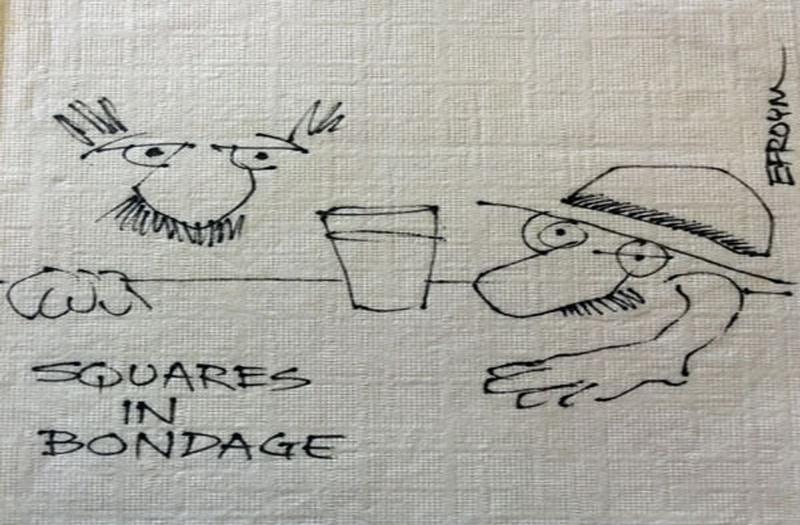“Bob has a motto on his wall which says ‘Life is just one damned thing after another!’” (The Concentrations of Bee, Lilian Bell)
It’s not true that life is one damn thing after another; it’s one damn thing over and over. Edna St. Vincent Millay
President Obama often cites a quote from Martin Luther King, Jr.: “The arc of the moral universe is long, but it bends toward justice.” While I would wish and hope for this to be true, I have my doubts. Surely, if it’s true, it isn’t automatic. We must constantly monitor and make changes when necessary. George Orwell, whose Animal Farm and Nineteen Eighty Four are once again relevant in America today, wrote that “our traditions and our past security have given us a sentimental belief that it all comes right in the end and the thing you most fear never really happens,” and that “we believe half-instinctively that evil always defeats itself in the long run.” Orwell was worried about these optimistic instincts because he knew the evidence suggests that things typically don’t turn out right on their own. A positive outcome requires concerted effort and vigilance against backsliding.
Our current President is very effective in using a strategy of doing “one outrageous thing after another” to reshape public perception and destroy the way in which our democracy functions. This aligns with what Steve Bannon famously called “flooding the zone with shit,” overwhelming the system so opponents can’t mount effective responses.
The strategy leads to outrage fatigue and desensitization. When scandals or shocking acts happen continually, the public’s capacity to react diminishes. Initially, each event sparks outrage, media frenzy, and debate. However, as the events pile up, people adapt psychologically by lowering their emotional response. Behaviors once considered beyond the pale become “part of the new normal.”
The modern news cycle rewards constant novelty. By creating a stream of provocative actions, our MAGA Prez manages to dominate the headlines and crowd out competing narratives and meaningful policy discussions. Opponents fall into the trap of responding to his moves rather than setting their own agenda. Outrage drives clicks and ratings and that leads to disproportionate coverage.
The result is polarization and tribal loyalty. The middle ground, where democracy thrives, shrinks, and compromise becomes politically toxic. The result is an environment where performative allegiance, not policy achievement, becomes the primary objective.
Democratic institutions rely on unwritten norms as much as laws. Constant boundary-pushing tests legal and constitutional guardrails. It reduces trust in checks and balances when enforcement seems inconsistent. It encourages future leaders, of any ideology, to adopt similar tactics, accelerating institutional decay.
The “one damn thing after another” approach is a marketing and cult-oriented technique, not a governing technique. Unpredictable actions keep supporters and opponents constantly engaged but rudderless. Chaos breeds confusion that makes it harder for the public to distinguish between significant and trivial controversies. Opponents are framed as corrupt and extreme while transgressive behavior is presented as authentic. The Tyranny of the Minority takes control.
A patriot faced with a government or leadership that acts against their beliefs finds themselves in a deeply moral and existential dilemma. At such a time, a true patriot like Tom Paine, transcends narrow nationalism. Doing good, fighting tyranny, and standing up for liberty are the truest forms of love for country, and for all people. Kurt Vonnegut saw healthy patriotism as loving your country enough to want it to be better. He rejected the idea that “true patriots” must support every government policy or action. He once said: “True terror is to wake up one morning and discover that your high school class is running the country.” He also said: “I am a veteran of the Second World War, and I know what patriotism looks like: it’s a lot more about protecting your neighbor than about killing strangers.” Another Vonnegut quote to help us get through difficult days: “We are here to help each other get through this thing, whatever it is.” For him, civic duty, was just a subset of a larger moral duty to humanity.
Don’t let yourself be throttled by one damn thing after another. Stand up for what matters to you. This morning Donald Trump said: “A lot of people are saying, ‘Maybe we like a dictator.’ I’m not a dictator. I’m a man with great common sense,” he insisted immediately after. It’s eerily similar to Richard Nixon’s comment: “people have got to know whether or not their President is a crook. Well, I’m not a crook. I’ve earned everything I’ve got.” What to do in these situations was pointed out clearly over a century ago by a rather obscure philosopher activist named Charles Péguy.
He who does not bellow the truth when he knows the truth makes himself the accomplice of liars and forgers.
He who allows things to be done is like him who orders them to be done.
Peguy also said: Tyranny is always better organized than freedom. It’s long past time we reorganize freedom or we will surely lose the freedom that’s shrinking every day right before our eyes.


I am hoping there is a save from the new normal….
(concerted effort and diligence?)
Isn’t that (partially) why we’re
here?
Thanks Dobby for all your comments. Yea, I spend hours making up blogs and never know if they get through to anyone or make a difference, but it’s what I do. Keeps me sharp, at least.
David,
Thank you for writing.
Yes I do think you make a
difference.
You are sharp.
This is a good contrast and role model for my 21 shock treatments brain.